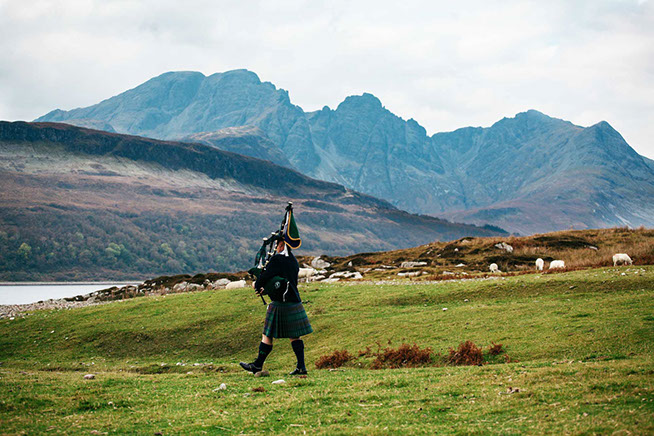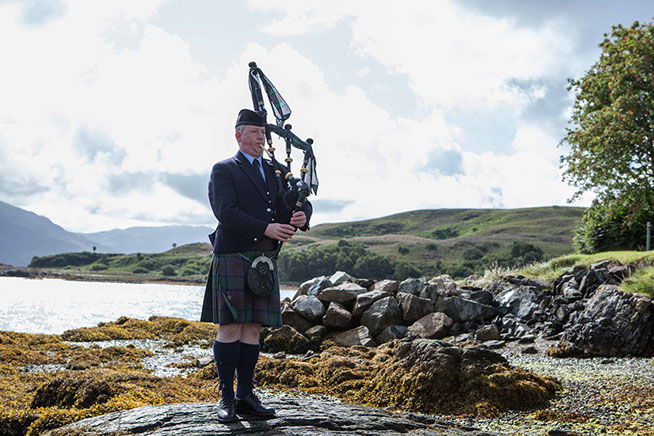Wedding piper
- from £270
Funeral piper
- from £150
Corporate events & Parties
- from £200
Ceilidh Band for weddings
- from £500
Disco
- £30 top of ceilidh band fee.
(Costs for these services vary according to requirements, travelling distance, times and dates. Special rates for midweek Monday – Thursday apply).
“Alistair is a fantastic piper and a lovely guy! He helped to make our day so special, and calmed a nerve or two as well! Excellent, professional service, would highly recommend to anyone looking for a piper for their special day ”.
A History of the Bagpipes on the Isle of Skye
A rich and interesting History...
Skye can boast to have had the greatest of all pipers in the renowned family of MacCrimmon, who were hereditary pipers to the MacLeod chiefs at Dunvegan. There is no lack of legend as to why they came to Dunvegan or where they came from originally. One school of thought says that they came from Cremona in Italy, while another says that they were an Irish tribe which found its way to Skye and which settled at Borreraig across the sea from Dunvegan. Some say that they actually came from St Kilda, went on to Harris and from there in the course of time made their way to Skye and to Dunvegan. The second theory, that they originated in Ireland, is perhaps based on the fact that there are a number of Crimmins living in the Cork area and it is said that Donald Mor MacCrimmon went to a seminary in Antrim to be taught piobaireachd. The clan is mentioned in the Wardlaw MSS and it says that a John MacCrimmon was in the service of the Earl of Sutherland. The Bannantyre MSS refers to the MacCrimmons being landlords in Harris and being originally descended from Paul Balkison, the powerful Norse leader.

The first piper of the family mentioned in Skye was Donald Mor (1570-1640). He, it is said, was a piper and a composer of great renown, and to him are attributed the great tunes "Lament for the Earl of Antrim", "MacLeod's Salute" and "MacLeod's Controversy". Donald Mor had one son Patrick Mor (1595-1670). This young man was an outstanding piper and according to tradition had unrivaled technical skills. He composed "Lament for the Only Son" and the "Lament for the Children".
Patrick's son Padruig Og was an outstanding piper and a teacher of great ability. One of his compositions was "The Lament for Mary MacLeod". Two of his sons, Malcolm and Donald Ban, inherited his musical genius. Malcolm succeeded his father as hereditary piper and farmed at Borreraig from 1730 to 1769. By all accounts Malcolm was the last MacCrimmon to inherit the musical genius. His two sons succeeded him and one of them, Iain Dubh, remained at Borreraig until 1791 when he and the chief appeared to fall into disharmony, causing the last of the pipers to leave Borreraig and settle in or around Glenelg.

Other pipers who were taught by the MacCrimmons were the noted MacArthurs, who came to Skye from Ulva near Mull and were taken on as hereditary pipers by the Lords of the Isles then resident in Duntulm. One of the most famous of the MacArthurs was called Charles, and it is said that he often went with the chief to Edinburgh and to Ayrshire where her met and befriended the noted poet of that part - Robert Burns. It is said locally that MacArthur passed on to Burns many of the local song tunes and that Burns adapted them and used some of them for his own songs. Charles MacArthur is buried in Kilmuir Cemetery and over his grave is a memorial stone with an incomplete inscription. Legend says that this was caused by the tragic death of his son who was paying for the sculpture of the stone.
Other natives of Skye who were taught by MacCrimmon at Borreraig were Alexander Bruce (1771-1840) and his brother John (1775-1847). John was in the service of Sir Walter Scott at Abbotsford.
After the MacCrimmons left the scene, piping in Skye suffered a decline with not many good pipers coming forward. D.A.Campbell of Glendale was a very fine piper as was Ronald MacKenzie of Ord. Then came Finlay MacRae, Portree, and his brother Angus who lived in Callander. Angus was a piper of very high esteem and competed with success against first class pipers such as Ross MacDonald and MacColl. Finlay's son Norman was for many years piper to Lochiel.
After World War I a group of piping enthusiasts formed Comunn Piobaireachd an Eilean Sgitheanach, which raised funds to pay for an instructor who set out to teach the youth of the island. The first such tutor was Andrew MacDonald, brother of the famous John MacDonald of Inverness. He was succeeded by William MacDonald who taught in Skye until 1930. It was during William MacDonald's period of teaching that the Portree Pipe Band was formed. This band performed on Saturday evenings in the village until the start of the Second World War. In 1948 Pipe-Major Angus MacKinnon and Mr Donnie MacKenzie reformed the band and it flourished until 1956 when loss of players again put a stop to its activities.
In 1960 the band was again re-formed and this time called the Isle of Skye Pipe Band. Other men of considerable talent were Pipe-Major Peter Bain, D.A.Campbell, Peter MacFarquhar, Alasdair MacKenzie and Donnie MacKenzie. Others who gave freely of their time to improve the standard of piping were the late Seton Gordon, Col. Jock MacDonald and Dr Allan MacDonald.
Today the Isle of Skye Pipe Band continues to flourish and there are a number of very fine pipers, both young and not so young, keeping the flag flying and ensuring that Skye keeps the place it formerly held in the piping world. Pipe Majors past and present include Willlam Watson, Angus McKinnon, Donnie MacKenzie, Norman Stoddart, Ron Monk, Ally K MacPherson, Lewis Barclay and Alan Mackenzie.
Menu
Price List:
Billy MacFarlane:
The Skye Piper
8 Stornoway Drive
Inverness
IV3 8GD
Email: info@skye-piper.co.uk
Tel: 01463 235638
Mob: 07979903440
Website design by
